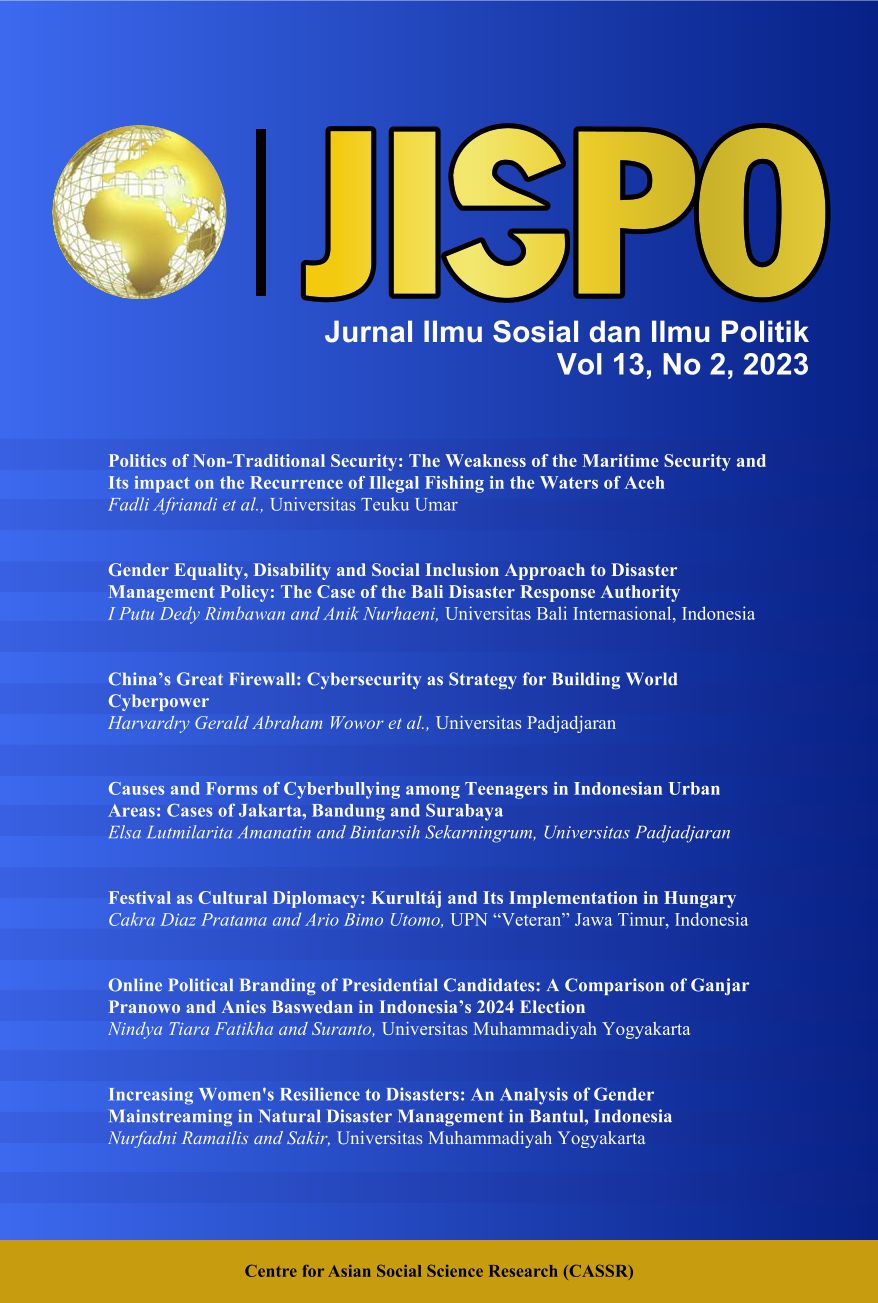Gender Equality, Disability and Social Inclusion Approach to Disaster Management Policy: The Case of the Bali Disaster Response Authority
DOI:
https://doi.org/10.15575/jispo.v13i2.28396Keywords:
GEDSI approach, gender equality, disability, social inclusion, disaster management policy, BaliAbstract
This article describes the application of the GEDSI (Gender Equality, Disability, and Social Inclusion) approach to disaster management policies with special reference to the Province of Bali. The province, which frequently experiences natural disasters such as earthquakes, volcanic eruptions and floods, recognizes the need to pay attention to gender differences, disabilities and social inclusion in all aspects of disaster management. The GEDSI approach promotes active participation and an equal role for all community members in dealing with disasters. The findings show that Bali is committed to ensuring equal access to information, protection and disaster management services for vulnerable groups. It seeks to integrate a gender perspective in disaster management planning, including ensuring women's participation in decision-making and their involvement in policy implementation. In addition, the GEDSI approach also emphasizes social inclusion and the needs of people with disabilities. Bali seeks to remove physical and social barriers that may impede the participation and accessibility of persons with disabilities during disasters. Disabled persons-friendly facilities and services are provided, and disability groups are involved in policy planning and evaluation. With the GEDSI approach, disaster management in Bali can be inclusive and responsive to the needs of all individuals. This approach will ensure equity, respect human rights and enhance sustainability in the face of natural disasters.
References
Andriani, Nurul Saadah. 2017. “Kebijakan Responsif Disabilitas: Pengarusutamaan Managemen Kebijakan di Level Daerah, Nasional dan Internasional.†Palastren 9(1):189–214.
Arjani, Ni Luh. 2007. “Kesetaraan dan Keadilan Gender (KKG) dan Tantangan Global.†2:27–37.
Darmanto, and Syarif Fadillah. 2010. “Kinerja Aparatur Pemerintah Daerah dalam Rangka Pelayanan Publik.†Ilmu Administrasi Negara 10(2):192–203.
Dunn, William. 1995. Analisa Kebijakan Publik. Yogyakarta: Hanindita Graha Widya.
Frich, Ndaumanu. 2020. “Penyandang Disabilitas Mental.†Jurnal HAM 11(1):131.
Hunga, Arianti Ina Restiani and Emy Susanti. 2023. “Penguatan GEDSI pada Penelitian dan Pengabdian Masyarakat dalam Memperkuat ‘ Merdeka Belajar Kampus Merdeka .’†(April). Risalah Kebijakan: Pemeringkatan Perguruan Tinggi Menurut Penelitian dan Pengabdian Masyarakat Berbasis GEDSI.
IFRC. 2018. “Minimum Standards for Protection, Gender and Inclusion in Emergencies.†IFRC Publication 1–116.
Kurzman, Charles, Willa Dong, Brandon Gorman, Karam Hwang, Renee Ryberg, and Batool Zaidi. 2019. “Women’s Assessments of Gender Equality.†Socius 5. doi: 10.1177/2378023119872387.
Marzuki. 2017. “Studi Tentang Kesetaraan Gender dalam Berbagai Aspek.†Studi Tentang Kesetaraan Gender Dalam Berbagai Aspek 1(1):1–13.
Muhaemin, Moh, Henky Mayaguezz, Anma Hari Kusuma, Oktora Susanti, Eko Efendi, Siti Hudaidah. 2022. “Peningkatan Kapasitas Kelompok Rentan Bencana (KRB) Melalui Program Sekolah Siaga Bencana (SSB) Sebagai Upaya Mitigasi Bencana di Desa Trimulyo Kabupaten Pesawaran.†Jurnal Pengabdian Fakultas Pertanian Universitas Lampung 01(02):295–303.
Mustafa, Dany. 2023. “Strategi Advokasi Komite Perlindungan dan Pemenuhan Hak Penyandang.†Inklusi 10(01):1–22.
Nandiini, Adelia Riyan, and Zulfahmi Yasir Yunan. 2022. “Peran Pekerja Sosial dalam Memberikan Penanggulangan Bencana Alam Bagi Penyandang DisabilitasPeran Pekerja Sosial Dalam Memberikan Penanggulangan Bencana Alam Bagi Penyandang Disabilitas.â€KAIS 65–71.
Pahleviannur, Muhammad Rizal. 2019. “Edukasi Sadar Bencana Melalui Sosialisasi Kebencanaan Sebagai Upaya Peningkatan Pengetahuan Siswa Terhadap Mitigasi Bencana.†Jurnal Pendidikan Ilmu Sosial 29(1):49–55. doi: 10.23917/jpis.v29i1.8203.
Parasasri, Ratu Riyaning Arum, and Ismi Dwi Astuti Nurhaeni. 2021. “Manajemen Bencana Responsif Gender: Kajian Inovasi Layanan Organisasi Pada Badan Penanggulangan Bencana Daerah Kota Surakarta.†Wacana Publik 1(1):62. doi: 10.20961/wp.v1i1.50891.
Pemerintah Provinsi Bali. 2023. “Visi dan Misi Pemerintah Provinsi Bali.†Pemerintah Provinsi Bali.
Pramudiana, Ika Devy. 2017. “Implementasi Kebijakan Pendidikan Inklusif Untuk ABK di Surabaya." Dimensi Pendidikan dan Pembelajaran 5(1):1–9.
Santoso, Anang Dwi, Irwan Noor, and Mochamad Chazienul Ulum. 2013. “Disabilitas dan Bencana (Studi Tentang Agenda Setting Kebijakan Pengurangan Risiko Bencana Inklusif Bagi Penyandang Disabilitas di Kabupaten Klaten, Jawa Tengah, Indonesia).†Adiministrasi Publik 3(12):2033–39.
Saputra, Nopriadi, and Riant Nugroho. 2021. “Good Governance pada Pelayanan Publik: Sebuah Usulan Model Pengembangan Berbasis Perilaku.†Jurnal MSDA (Manajemen Sumber Daya Aparatur) 9(1):11–26. doi: 10.33701/jmsda.v9i1.1559.
Saputri, Dwi Oktavallyan. 2022. “Fasilitas Pejalan Kaki Bagi Penyandang Disabilitas pada Jalur Pedestrian Lapangan Merdeka Kota Bengkulu.†Journal of Disability Studies: INKLUSI 9(2):125–42.
Sardjunani, Nina. 2013. “Kesetaraan Gender dalam Pendidikan di Indonesia.†Education Sector Analytical And Capacity Development Partnership (September):1–6.
Sinollah, Sinollah, and Masruroh Masruroh. 2019. “Pengukuran Kualitas Pelayanan (Servqual-Parasuraman) dalam Membentuk Kepuasan Pelanggan Sehingga Tercipta Loyalitas Pelanggan.†Dialektika: Jurnal Ekonomi dan Ilmu Sosial 4(1):45–64. doi: 10.36636/dialektika.v4i1.285.
Sphere Association. 2018. The Sphere Handbook: Humanitarian Charter and Minimum Standards in Humanitarian Response. Vol. 1.
Traustadóttir, Rannveig. 2006. “Disability and Gender: Introduction to the Special Issue.†Scandinavian Journal of Disability Research 8(2–3):81–84. doi: 10.1080/15017410600831341.
UN Women. 2021. “Women ’ S Resilience to Disasters.†2.
United Nations Development Programme. 2018. “Gender Equality Strategy 2018-2021.†United Nations Development Programme 28.
Yaneri, Ahmad, and Arini Dwi Deswanti. 2021. “Analisis Kesetaraan Gender dan Inklusi Sosial pada Program Perlindungan Sosial: Studi Kasus Bantuan Sosial Tunai Covid-19 di Kabupaten Bandung Barat.†Pekerjaan Sosial 20(1):70–84. doi: 10.31595/peksos.v20i1.381.
Downloads
Published
How to Cite
Issue
Section
License
Authors who publish their manuscripts in JISPO agree to the following terms:
- Authors retain copyright and grant the journal right of first publication with the work simultaneously licensed under a Creative Commons Attribution-ShareAlike 4.0 International License that allows others to share the work with an acknowledgment of the work's authorship and initial publication in this journal;
- Authors are able to enter into separate, additional contractual arrangements for the non-exclusive distribution of the journal's published version of the work (e.g., post it to an institutional repository or publish it in a book), with an acknowledgment of its initial publication in this journal; and
- Authors are permitted and encouraged to post their work online (e.g., in institutional repositories or on their websites) after publication process, or prior to and during the submission process, as it can lead to productive exchanges, as well as earlier and greater citation of published work (See The Effect of Open Access).


